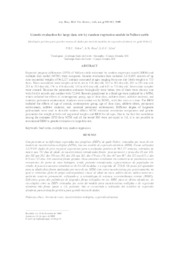Genetic evaluation for large data sets by random regression models in Nellore cattle.
Genetic evaluation for large data sets by random regression models in Nellore cattle.
Author(s): NOBRE, P. R. C.; ROSA, A. do N.; SILVA, L. O. C. da
Summary: Expected progeny differences (EPD) of Nellore cattle estimated by random regression model (RRM) and multiple trait model (MTM) were compared. Genetic evaluation data included 3,819,895 records of up nine sequential weights of 963,227 animals measured at ages ranging from one day (birth weight) to 733 days. Traits considered were weights at birth, ten to 110-day old, 102 to 202-day old, 193 to 293-day old, 283 to 383-day old, 376 to 476-day old, 551 to 651-day old, and 633 to 733-day old. Seven data samples were created. Because the parameters estimates biologically were better, two of them were chosen: one with 84,426 records and another with 72,040. Records preadjusted to a fixed age were analyzed by a MTM, which included the effects of contemporary group, age of dam class, additive direct, additive maternal, and maternal permanent environment. Analyses were carried out by REML, with five traits at a time. The RRM included the effects of age of animal, contemporary group, age of dam class, additive direct, permanent environment, additive maternal, and maternal permanent environment. Different degree of Legendre polynomials were used to describe random effects. MTM estimated covariance components and genetic parameters for weight at birth and sequential weights and RRM for all ages. Due to the fact that correlation among the estimates EPD from MTM and all the tested RM were not equal to 1.0, it is not possible to recommend RRM to genetic evaluation to large data sets.
Publication year: 2009
Types of publication: Journal article
Unit: Embrapa Beef Cattle
Observation
Some of Embrapa's publications are published as ePub files. To read them, use or download one of the following free software options to your computer or mobile device. Android: Google Play Books; IOS: iBooks; Windows and Linux: Calibre.
Access other publications
Access the Agricultural Research Database (BDPA) to consult Embrapa's full library collection and records.
Visit Embrapa Bookstore to purchase books and other publications sold by Embrapa.

